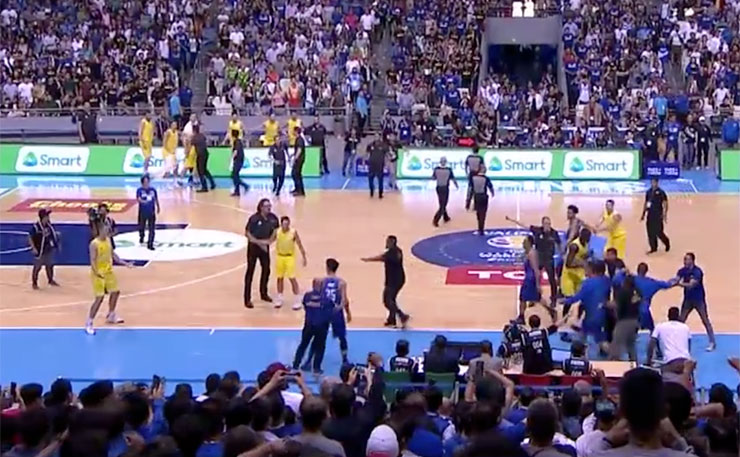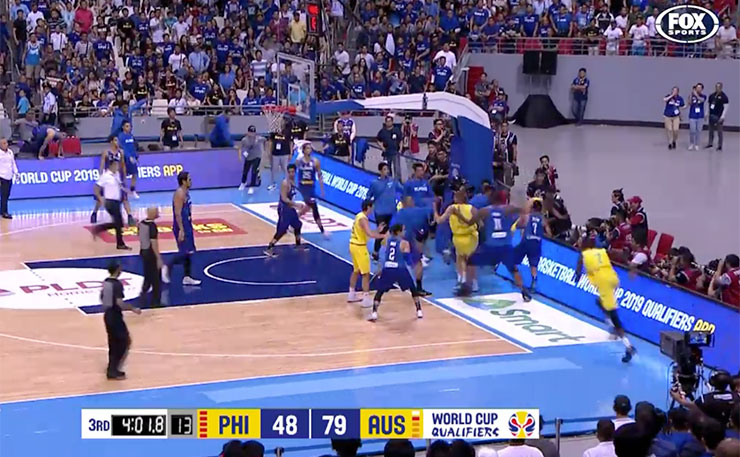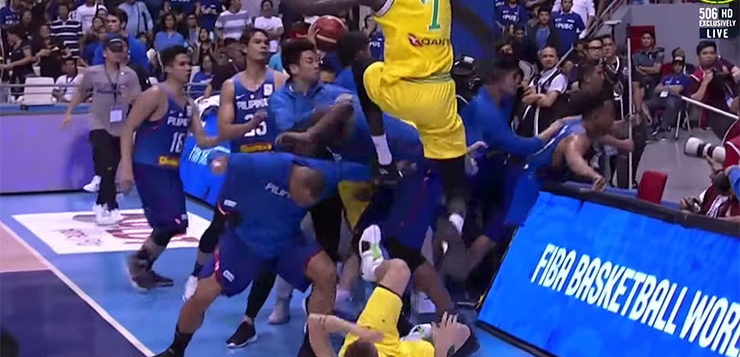Australia’s response to an ugly brawl overnight during an international basketball match says something pretty important about our nation, writes Chris Graham.
I don’t know a lot about basketball. I used to play a bit, but I’m no expert. But you don’t have to be an aficionado to know what very bad sportsmanship, violence and shithouse, partisan sporting commentary looks like.
Welcome to last night’s World Cup qualifier basketball match between Australia and the Philippines, which has made global headlines this morning after a particularly ugly brawl.
The commentary in Australia is overwhelmingly that we were the victims in the fracas. I don’t think it’s stretching the imagination to think that the rest of the world won’t be so sympathetic, in large part because there’s these things called ‘television cameras’, ‘slow motion replay’ and ‘simple common sense’, which, when applied, will leave the viewer in no real doubt about who the bad guys are.
Long story short, it’s us.
You can view the footage here. Or watch it below and make your own mind up.
But if your mind does happen to come to the conclusion that Australia is not at fault – and the commentary is not spectacularly inaccurate and willfully blind – then watch it again… and if you’re still not convinced, then maybe accept you’re part of a very long sporting tradition in this country of accepting exceptionally bad behaviour, followed by a general refusal by Australians to accept said behaviour, unless, like in the case of the recent ball tampering scandal in cricket, the behaviour is so obvious and bad that there’s simply no other way out.
Which is what clearly should be the case on this occasion. Let’s break it down shall we.
Ten seconds into the video, a Philippines player commits a clear offensive foul on an Australian defender. The referee calls the foul.
A few seconds later, Australian player Daniel Kickert rushes in and unleashes a flying elbow on the Filipino player. Yes, a flying elbow, like you might see in an MMA match.
If you want to see the actual force of Kickert’s strike, skip ahead to 2:40 for the overhead shot. It’s quite something to behold.
So is the behaviour and commentary that followed.
After assaulting at least two other Filipino players, and then turning and running as he’s chased across the court, Kickert manages to escape to the safety of some officials, but not before turning and dancing and gesturing at the Filipino players to come and have another go.
Again, it’s there on video… clear as day, right there at the 30 second mark. The instigator of the brawl became the first to flee the fight, only to turn around from a safe distance and try and restart it.

Notably, Kickert’s behaviour goes largely unscrutinised by the Australian commentators, save for a few benign remarks.
“Cheap play from Kickert whose come in from the sideline…” That was a line delivered as Kickert elbowed the Filipino player in the jaw. But then followed by this: “That’s cheap from the Filipino’s to start with. Kickert’s come in and stuck up for his team-mates.”
Well what he’s actually done is committed a criminal assault. The ‘cheap’ play from the Filipino was a pretty common offensive foul on a player, Chris Goulding, who was shaping up, and who was preparing to make contact. At 5:50, even the commentators note Gouding’s reaction was exaggerated, and that what the Filipino player actually did was “chesting”. Kickert’s strike, by contrast, was a blindside elbow to the jaw of a player who wasn’t expecting it.
And yet, the commentators continued: “[A Filipino] player should be fined for throwing such a soft punch anyway.”
And then this, which accompanied a slow motion replay from another angle which shows Kickert’s flying elbow again: “So, an uncalled for response from Daniel Kickert…. but that was after it was instigated by the contact by the Filipinos on Chris Golding.”
Apparently undeterred by reality, the commentators continue: “Have a look at these flying punches and kicks that come from the Filipinos…” As the line was being delivered, an Australian player literally came flying into the brawl with a kick, and then out again with another as the commentator pauses.
And then this: “That’s followed by what can only be described as coward attacks on people looking the other way.”
Yes. By both teams. Having been started by a ‘coward attack’ by an Australian player on a Filipino player looking the other way.

And then, quite spectacularly, this at 4:10: “Thom Maker (an Australian player) is out of line for flying through the air with feet first. But look at that, from Romeo, a punch to the back of the head [of]a man not even looking at him.”
The footage being described does indeed show Maker flying through the air (the picture above shows the run up)… and landing with his knees on the back of a Filipino player who is, what’s the phrase, “not even looking at him”. For the record, Maker is just over 7ft tall and weighs 101kg.
It’s at that point that Romeo does indeed hit Maker – very ineffectually mind you – in the back of the head. But he’s a ‘coward puncher’ while the Australian player is ‘out of line’.
All up, it’s a pretty tawdry affair, by players from both sides, and commentators. Australia already has an international reputation as a pretty bad sporting nation. Bad in the sense of our behaviour. This latest incident doesn’t do much to dissuade the world of that notion. More importantly, it looks like we’ll miss another opportunity internally to have a reasonable discussion about the behaviour of our sporting icons.
But then, we jail and torture children on faraway islands and demonise some of the nation’s poorest people. I guess being bad sports is the least of our problems, but maybe it’s part of the key to a more honest assessment of our real national character.
The author of this article Facebooks here and Tweets here.
Donate To New Matilda
New Matilda is a small, independent media outlet. We survive through reader contributions, and never losing a lawsuit. If you got something from this article, giving something back helps us to continue speaking truth to power. Every little bit counts.




